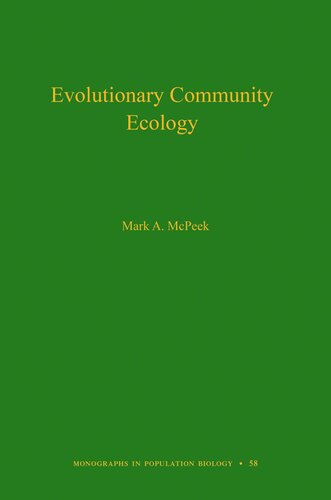

Most ebook files are in PDF format, so you can easily read them using various software such as Foxit Reader or directly on the Google Chrome browser.
Some ebook files are released by publishers in other formats such as .awz, .mobi, .epub, .fb2, etc. You may need to install specific software to read these formats on mobile/PC, such as Calibre.
Please read the tutorial at this link: https://ebookbell.com/faq
We offer FREE conversion to the popular formats you request; however, this may take some time. Therefore, right after payment, please email us, and we will try to provide the service as quickly as possible.
For some exceptional file formats or broken links (if any), please refrain from opening any disputes. Instead, email us first, and we will try to assist within a maximum of 6 hours.
EbookBell Team

4.7
96 reviewsEvolutionary Community Ecology develops a unified framework for understanding the structure of ecological communities and the dynamics of natural selection that shape the evolution of the species inhabiting them. All species engage in interactions with many other species, and these interactions regulate their abundance, define their trajectories of natural selection, and shape their movement decisions. Mark McPeek synthesizes the ecological and evolutionary dynamics generated by species interactions that structure local biological communities and regional metacommunities.
McPeek explores the ecological performance characteristics needed for invasibility and coexistence of species in complex networks of species interactions. This species interaction framework is then extended to examine the ecological dynamics of natural selection that drive coevolution of interacting species in these complex interaction networks. The models of natural selection resulting from species interactions are used to evaluate the ecological conditions that foster diversification at multiple trophic levels. Analyses show that diversification depends on the ecological context in which species interactions occur and the types of traits that define the mechanisms of those species interactions. Lastly, looking at the mechanisms of speciation that affect species richness and diversity at various spatial scales and the consequences of past climate change over the Quaternary period, McPeek considers how metacommunity structure is shaped at regional and biogeographic scales.
Integrating evolutionary theory into the study of community ecology, Evolutionary Community Ecology provides a new framework for predicting how communities are organized and how they may change over time.